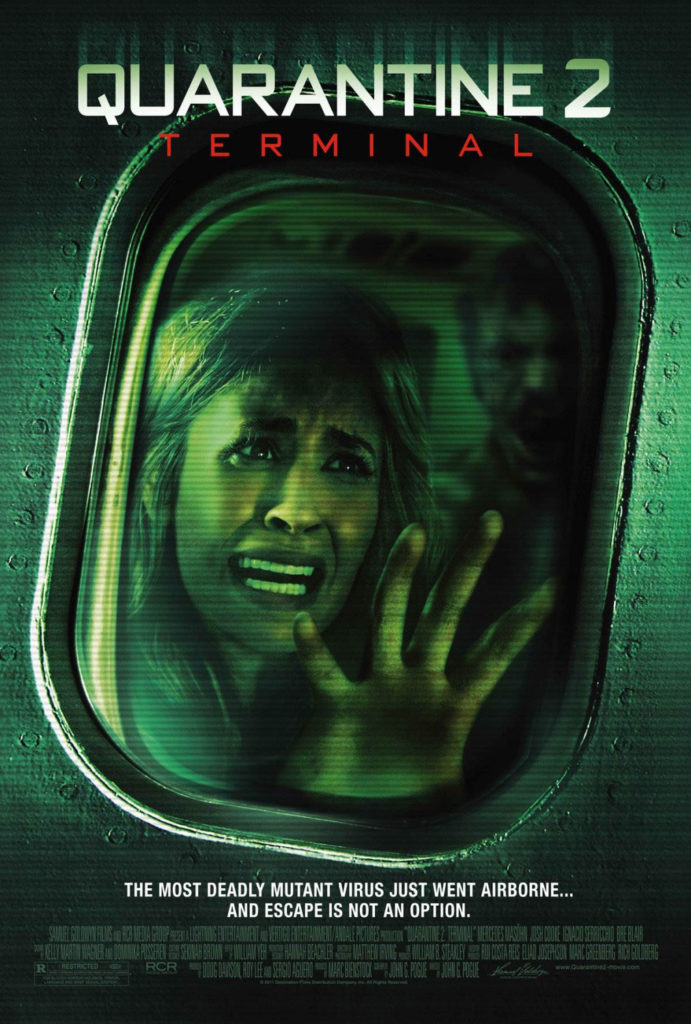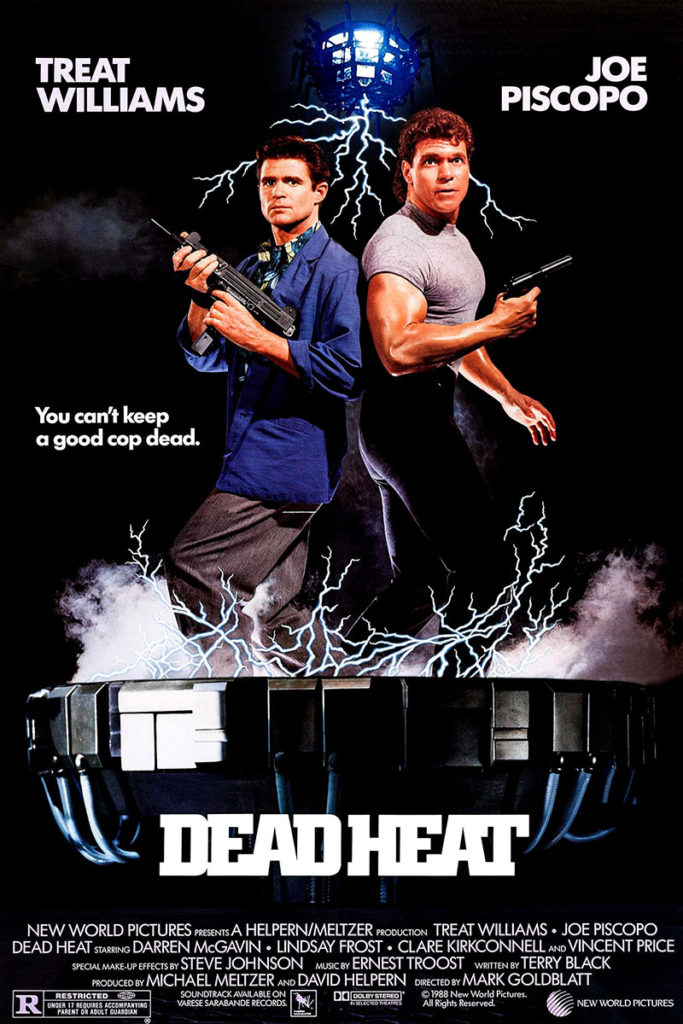Beware cheap horror films with awesome titles. Growing up a horror fan, I had seen the VHS box of I Spit on Your Grave many times at the local video store in the sci-fi/horror section. It screamed cheapness, and did nothing to make it stand out among such fare as My Bloody Valentine or I Dismember Mama. So I always passed it up. I’ve seen it now, and while it didn’t make me wish I could claw out my eyes, or that I could build a time machine and go back to warn myself away from watching it (The Human Centipede), I do believe my life is not one whit better for having seen it. Continue reading “I Spit on Your Grave”
Quarantine 2: Terminal & [•REC] 2
 Anyone who has a fear of flying knows that it is not just the flight itself that causes anxiety. It’s not something that creeps up on a person in the line for security at the airport, or even back at home packing bags. It can begin weeks or even months before a person is supposed to step on a plane. It can begin at the mere thought that it might be time to plan a vacation, or with the realization that it’s been awhile since the last visit to the west coast office, and it’s only a matter of time before the boss shoves some airline tickets and an itinerary into a folder and puts it right on top of the inbox. Just the thought of flying can add an extra layer of tension to a person who hasn’t been on a plane in years, and has no intention of doing so.
Anyone who has a fear of flying knows that it is not just the flight itself that causes anxiety. It’s not something that creeps up on a person in the line for security at the airport, or even back at home packing bags. It can begin weeks or even months before a person is supposed to step on a plane. It can begin at the mere thought that it might be time to plan a vacation, or with the realization that it’s been awhile since the last visit to the west coast office, and it’s only a matter of time before the boss shoves some airline tickets and an itinerary into a folder and puts it right on top of the inbox. Just the thought of flying can add an extra layer of tension to a person who hasn’t been on a plane in years, and has no intention of doing so.
After booking a flight, strange omens can be seen almost everywhere. Patterns emerge. One night there’s a dream of a plane crash, followed by an entire week of seeing plane crashes in movies, television shows, and on the news. It’s surprising just how often we see a plane crash, whether in fiction or in reality, if one really pays attention. Of course, reason battles constantly with such irrational, emotional considerations, and those of us who aren’t truly crippled with a phobia suck it up and fly when we have to, sometimes aided by some chemical bravery. After all, flying is the safest way to travel. What’s there to worry about? Continue reading “Quarantine 2: Terminal & [•REC] 2”
Resident Evil
I’ve seen Resident Evil four times. Each time, it gets worse. Don’t ask me why I’ve dedicated five precious hours of my life to this dog. I have no answer. I wish I could swear this last viewing was the final viewing, but who knows? Maybe it will be, now I’ve bothered to write a review. Continue reading “Resident Evil”
The Orphanage
I love the American movie business sometimes. If there’s a trailer where cast members have no dialogue other than shouting someone’s name, it’s a dead giveaway the film has subtitles. Can’t show any in the trailer, because movie companies think we’re stupid.
I have to be honest. Sometimes when watching films, it feels as if there is nothing new happening onscreen. Action films, drama, thillers, sci-fi, horror, etc. It can all take on a distinct sheen of sameness. Take ghost films. I’ve seen more than a few of them, and if the plot involves a wife, husband, and a child or children, then there are a few things a viewer can expect. First, the child will all of a sudden have a couple of ‘imaginary’ friends to play with. This causes looks of concern from the parents, but little more. Of course, out here on the other side of the screen, we know the little tyke’s imagination hasn’t just been running wild. Rather, they’ve been seeing ghosts. Continue reading “The Orphanage”
Kingdom of the Spiders
I have a mental list of things I would do if I could go back in time. The standard stuff is there. Kill Hitler, catch a live performance of Beethoven’s Ninth with the composer himself conducting, etc. But those are representative of my more grandiose schemes. Far down the list is finding some way to weasel into the movie industry, and direct a film starring William Shatner in the 1970s. It’s a fleeting obsession, really, and was conceived only after watching Shatner’s star turn in Kingdom of the Spiders, from 1977. Continue reading “Kingdom of the Spiders”
Dead Heat (1988)
 “These caps[sic] are on the biggest murder case of their lives...their own.”
“These caps[sic] are on the biggest murder case of their lives...their own.”
So declares the DVD box art for the 1988 zombie action flick Dead Heat. When searching for a shitty movie to idly pass an evening, a typo on box art is a pretty fair indication a viewer has found a winner. Any movie called Dead Heat and starring Joe Piscopo doesn’t need any extra hint that it’s a special film, but the fact the producers didn’t care enough to release the flick with a simple bit of copy editing on the box is just icing on the cake.
Directed by Mark Goldblatt, Dead Heat follows two 1980s Hollywood-style rogue cops, Detectives Mortis and Bigelow (Treat Williams and Piscopo, respectively), as they try to track down a ring of armed robbers that have an uncanny ability to absorb massive amounts of flying bullets and not die. The film opens with a shootout of ridiculous proportions to ram this point home, as a pair of robbers armed with Uzis take on half the police force in a shootout on the street. Cops are dropping left and right, but no matter how many times the perps are shot, they just won’t go down. It takes a grenade and a speeding car to do the trick. To start the film, this scene is a total howler, in the scale of its violence and its absurdity. It does wonders to set up the rest of the film for a viewer. Continue reading “Dead Heat (1988)”
The Crazies (1973)
Is George Romero paranoid? It’s a possibility. At the very least, I would say he is mistrusting of authority. Night of the Living Dead, his seminal work, and all its follow-ups, showcase a horde of the undead rendering civilization waste. But it’s worth remembering that Romero’s zombies are not supernatural in origin. Rather, they are the result of government experiments gone wrong. Ergo, it’s not the zombies that are the greatest threat to civilization in Romero’s universe. It is the people who take our taxes. Continue reading “The Crazies (1973)”
The Circus Continues
One can never tell who is really winning an election until the votes are tallied. But right now, Mitt Romney is losing. After the expected convention bounce in his poll numbers failed to appear, and President Obama got his after the Democratic turn a week later, it’s been nothing but bad news for Romney. His party’s message is failing to resonate with independent voters. More of them trust Obama and the Democrats on the economy and on entitlements. In the midst of an ongoing crisis in Libya, in which four American foreign service members lost their lives, his campaign politicized the moment with false accusations about administration actions and was roundly panned by just about everyone. People within his own party are now saying on the record that Romney will say anything to win the presidency — that he is emanating an unseemly desire for the job that voters tend to pick up on and reject. He is increasingly seen as out of touch with common Americans. And now this: Continue reading “The Circus Continues”
Backdraft
Do NOT trust this trailer. This movie sucks.
Nothing is ever interesting enough for Hollywood. If you pitch them a movie about mountain climbers starring Sylvester Stallone, they follow that up by asking what the hook is. Alpine climbing in bad weather just isn’t compelling in their line of thinking, so the movie has to be augmented with a bunch of bad guys who robbed the Treasury Department. And that’s how we got the movie Cliffhanger. Continue reading “Backdraft”
Dirty Harry
 The tough-nosed cop with a disdain for the rules is a staple in film. Always butting heads with desk-bound lieutenants and mayors more concerned with getting reelected than cleaning up the streets, this breed of law enforcement officer has little time for procedure or the niceties of due process. Largely a fabrication of Hollywood, this cop operates in a world where the worse the crime, the more likely the guilty will go free due to the dreaded plot device known as “technicalities.” It’s all the more galling because there is never any doubt to the audience or to the hero that the bad guy is bad. Letting the bad guy go free because his rights were violated is nothing less than a miscarriage of justice, and it’s always left up to the hero cop to right such grievous wrongs. No film comes to mind that explored these ideas more effectively than 1971’s Dirty Harry. Continue reading “Dirty Harry”
The tough-nosed cop with a disdain for the rules is a staple in film. Always butting heads with desk-bound lieutenants and mayors more concerned with getting reelected than cleaning up the streets, this breed of law enforcement officer has little time for procedure or the niceties of due process. Largely a fabrication of Hollywood, this cop operates in a world where the worse the crime, the more likely the guilty will go free due to the dreaded plot device known as “technicalities.” It’s all the more galling because there is never any doubt to the audience or to the hero that the bad guy is bad. Letting the bad guy go free because his rights were violated is nothing less than a miscarriage of justice, and it’s always left up to the hero cop to right such grievous wrongs. No film comes to mind that explored these ideas more effectively than 1971’s Dirty Harry. Continue reading “Dirty Harry”
